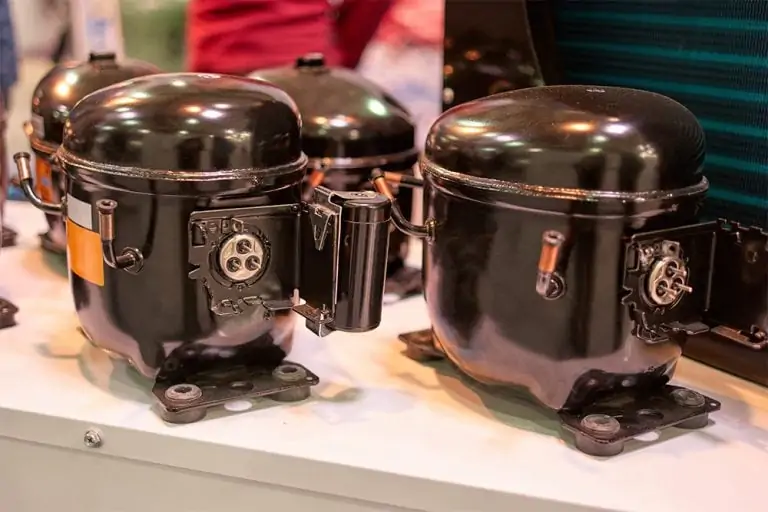
Compressors in older refrigerators tend to be fixed speed compressors. They turn on or off depending on the temperature variability, and they output the same amount of energy no matter what the temperature variable is. This abrupt on and off mechanism can wear out the intricate parts of the compressor and affect its durability.
Commercial fridges and freezers need high quality compressors which efficiently manage any temperature variation in the fridge or freezer to a precise degree. Our range of commercial display refrigerators contain heavy duty Embraco compressors which efficiently keeps the refrigerator cold so that your products remain fresh.
Inverter compressors are made up of intricate parts that power a motor to compress gas. The AC power is converted to DC using a controller. This controller then supplies power in varied frequencies to the motor, which controls the motor speed to accurately keep the temperature of the refrigerator steady. The most common motor for digital inverter compressors is called a BLDC.
As well as consistently keeping the temperature of the fridge or freezer steady, a digital inverter compressor also consumes 40% less energy than single speed compressors, and makes far less noise.
There are several things that can go wrong with your commercial fridge compressor, which has to combat constant door opening and fluctuations in temperature. Some signs that point to a faulty compressor include:
Your compressor should be making a gentle humming or buzzing noise. The sound should come and go as the compressor regulates its speed to adjust for variations in temperature within the refrigerator.
If the humming or buzzing sound becomes much louder, that could indicate a problem with the compressor. If the compressor makes a knocking or clunking sound, this also indicates potential mechanical damage.
Your refrigerator compressor may overheat if the system is low in refrigerant due to a leak somewhere along the line, which is now forcing the compressor to work much harder. The compressor may also overheat due to age and wear.
If the compressor is varying its speed too frequently and switching off before the refrigerator has a chance to cool down properly, then there may be a problem with the compressor relay, or there is another fault in the system causing the compressor to shut off prematurely.
A sudden spike in voltage can cause the compressor to overheat, and damages other components of the fridge.
The compressor relay is what sends power to the compressor, and if it’s not properly connected then the compressor will not work correctly.
The condenser coils may get covered in dirt, dust, grime, hair, and other debris. If the condenser coils are not regularly cleaned, this can impede the refrigerator’s ability to effectively cool down. This causes the condenser to work much harder, resulting in possible overheating, the compressor becoming mechanically stuck and not being able to compress the refrigerant properly.
The refrigerant continuously runs through the entire refrigeration system, so if there is not enough refrigerant, the compressor will have to work much harder and is at risk of over heating.
A fridge compressor is a hard working machine that powers the refrigeration cycle. After years of hard work, it may simply be wearing out.
The most important thing is to keep all the components of your commercial refrigerator clean. Avoid tampering with the compressor yourself, as the refrigerant may leak which is dangerous to you and bad for the environment. If you suspect a problem with your compressor, get a qualified technician to inspect it and advise you on the best course of action.